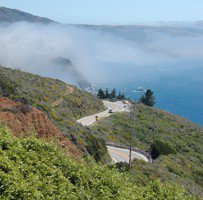As the traveling season gets nearer, maybe you have some lovely, exciting plans to fly someplace distant across several time zones. In that case you’ll have to contend with jetlag, and if you do, I want to share a cool tip I first heard about from my friend Adam, who himself picked it up from Jason Kottke.
The advice is simple: you should fast for 12 to 16 hours before breakfast time at your destination.
The reasoning is that the digestive system plays a significant role in our body’s perception of time. This voluntary fast is meant to mimick an overnight fast (minus the midnight munchies) and helps to set the body’s internal clock to the new time zone.
I happened to read about this just before we left to spend some time in San Francisco in the fall, and since we were about to embark on a round trip of 12-hour flights with 9-hour time differences, I was quick to recruit myself as a guinea pig to test the technique.
And I’m thrilled to report it worked really well: I sailed through the time difference with just about the same effects I get from taking the metro, even though I got virtually no sleep on the plane, thanks to a very sweet, but very alert little boy sitting on my knee.
It was very easy to put in practice, too.
On both legs of the journey, from Paris to San Francisco and from San Francisco back to Paris, we had mid-morning flights, so I had a (slightly more copious than usual) dawn breakfast before leaving for the airport.
I then abstained from food for a little over 12 hours — but drank lots and lots of water — before I dug into the most satisfying break-fasts I had brought along with me: a mix of dried figs and prunes, roasted hazelnuts, and 100% cacao chocolate on one way, and some sprouted trail mix (pictured above) with a side of Taza 80% stone ground chocolate on the other. (Airline frankencheese croissant in plastic pouch? I’m good, but thank you.)
I realize that mealtime on the plane is the only thing that keeps some travelers from dying of boredom, but I actually turn down the airplane meal if I can help it, preferring to bring my own. So this fasting thing actually makes my traveling life much simpler, saving me the effort of buying, cooking, packing, and carrying more than just the above-mentioned, easy snacks.
I’d had zero experience with fasting before that, and I was not accustomed to go for that many waking hours without eating, so my biggest surprise was how little effort it required: I did feel light hunger pangs every once in a while, but they quickly dissipated if I drank water and turned my mind to other things.
And in truth, the stuffy atmosphere and canned smell of commercial airplanes aren’t particularly conducive to working up an appetite, so I found it was actually a relief to not think about food at all under those circumstances.
Join the conversation!
Have you ever tried this trick to ward off jetlag? Or have you experimented with other techniques to fight it? And do you have any experience with voluntary fasting, travel-related or otherwise?
Important note
While this kind of short-term fasting is fine for healthy adults to experiment with, you should naturally check with your doctor if you’re pregnant or have any sort of health issue.














